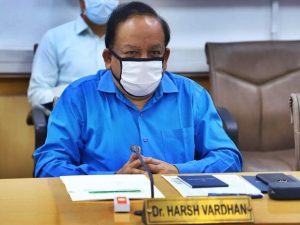 New Delhi: In view of an unprecedented surge in coronavirus cases, the Ministry of Health & Family Welfare has issued a revised guideline for home isolation of suspected COVID-19 patients. The Health Ministry has issued new guidelines since a large number of people showing no symptoms have being detected for COVID-19.
New Delhi: In view of an unprecedented surge in coronavirus cases, the Ministry of Health & Family Welfare has issued a revised guideline for home isolation of suspected COVID-19 patients. The Health Ministry has issued new guidelines since a large number of people showing no symptoms have being detected for COVID-19.
The revised home isolation guidelines has been issued to include asymptomatic positive patients in the list of mild or pre-symptomatic coronavirus infection cases. However, patients suffering from immune-compromised status (like HIV, transplant recipients, cancer therapy) are not eligible for home isolation, the revised guidelines stated.
Also, elderly patients aged more than 60 years and those with co-morbid conditions such as hypertension, diabetes, heart disease, chronic lung/liver/kidney disease and cerebrovascular disease among others shall only be allowed home isolation after proper evaluation by the treating medical officer, the ministry guideline said.
Patients under home isolation will stand discharged after 10 days of onset of symptoms and no fever for three days, the guidelines stated.
“Thereafter, the patient will be advised to isolate at home and self-monitor their health for further seven days. There is no need for testing after the home isolation period is over,” stated the ‘Revised Guidelines for Home Isolation of Very mild/pre-symptomatic/asymptomatic COVID-19 cases’.
According to the document, asymptomatic patients like the ones who are pre-symptomatic and have very mild symptoms can opt for home isolation if they have the requisite self-isolation facility at their residence so as to avoid contact with other family members.
The guidelines were issued as India’s COVID-19 tally soared by over 20,000 in a day for the first time taking the country’s total tally to 6,25,544 on Friday, while the death toll climbed to 18,213 with 379 new fatalities, according to the Union Health Ministry data.
The country recorded 20,903 coronavirus infections in the last 24 hours till Friday 8 am, with Maharashtra, Tamil Nadu, Delhi, Telangana and Karnataka being the major contributors to the single-day rise. The number of recoveries stands at 3,79,891, while one patient has migrated. There are 2,27,439 active cases of coronavirus infections currently in the country.
“Thus, around 60.73 per cent of patients have recovered so far,” an official said. The total number of confirmed cases include foreigners. There has been?a surge of 4,35,009 COVID-19 cases from June 1 till date, the data suggested.
According to the ICMR, a cumulative total of 92,97,749 samples have been tested up to July 2 with 2,41,576 samples being tested on Thursday. According to the guidelines, a caregiver should be available to provide care on a 24×7 basis and communication link between the caregiver and a hospital is a prerequisite for the entire duration of home isolation.
Besides, the guidelines reiterated that the caregiver and all close contacts of such cases should take hydroxychloroquine as a preventive medication according to the protocol and as prescribed by the treating medical officer.
Besides, it calls for downloading the Arogya Setu mobile application and that it should remain active at all times (through Bluetooth and wi-fi).
Patients should monitor their health and regularly inform the health status to the district surveillance officer, who will facilitate further follow up by the surveillance teams.
The patient also has to give an undertaking stating being diagnosed as a confirmed/suspect case of COVID-19, he/she hereby voluntarily undertake to maintain strict self-isolation at all times for the prescribed period, they said.
Immediate medical attention must be sought if serious signs or symptoms, including difficulty in breathing, dip in oxygen saturation, persistent pain/pressure in the chest, mental confusion or inability to arouse, slurred speech/seizures, weakness or numbness in any limb or face and developing bluish discolorations of lips/face, the guidelines stated.
The guidelines state that states and districts should monitor all such cases and that the health status of those under home isolation should be monitored by the field staff/surveillance teams through personal visits along with a dedicated call centre to follow up on the patients on a daily basis.
The clinical status of each case should be recorded by the field staff/call center (body temperature, pulse rate and oxygen saturation).
The field staff will guide the patient on measuring these parameters and provide the instructions (for patients and their caregivers), they said.
Besides, details about patients under home isolation should also be updated on the COVID-19 portal and facility app (with DSO as user). The mechanism to shift patient in case of violation or need for treatment has to be established and implemented.
All family members and close contacts shall be monitored and tested as per protocol by the field staff. These discharge guidelines shall be strictly adhered to along with the issuance of a fitness certificate by the field team, they added.
Leave a Reply